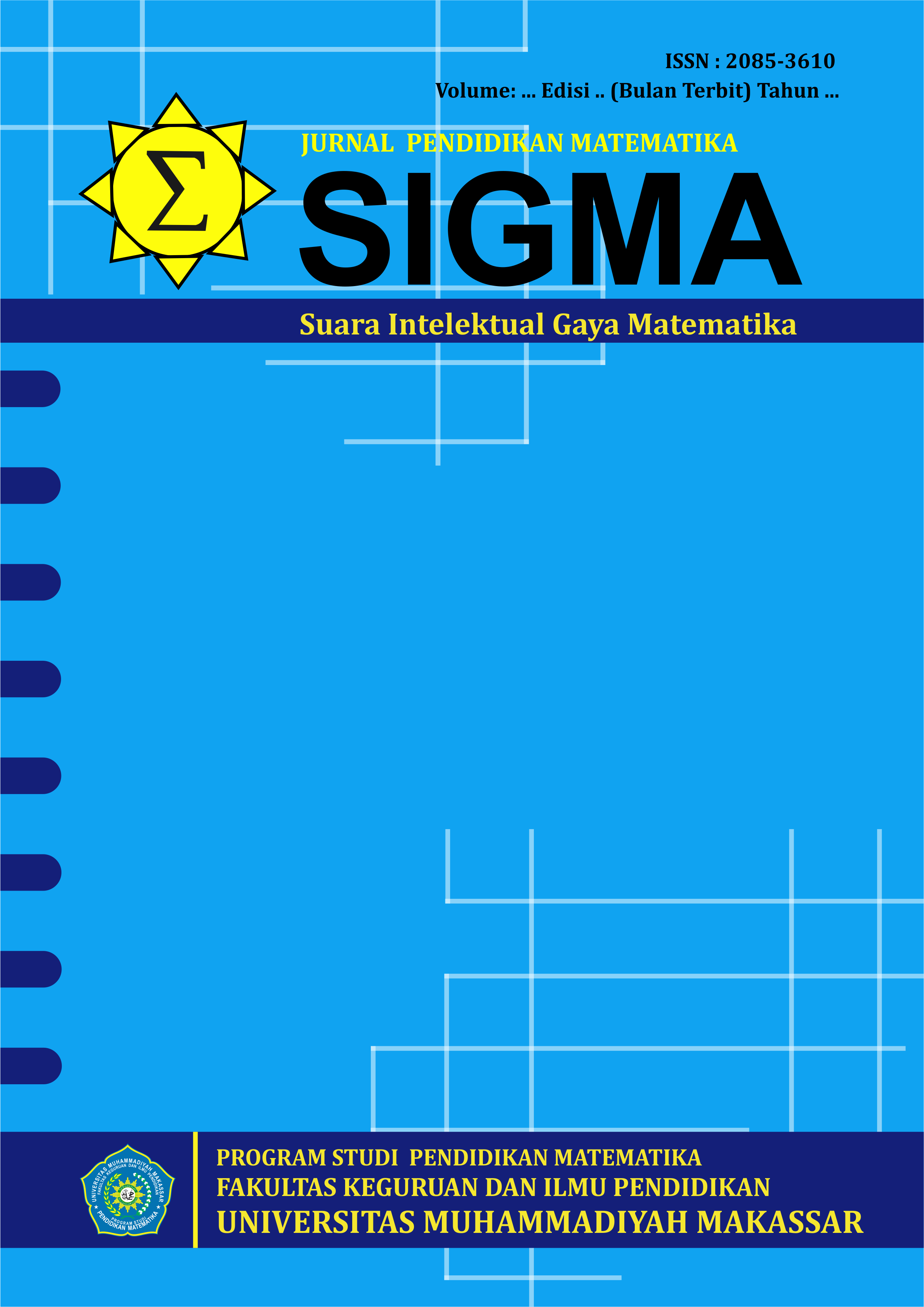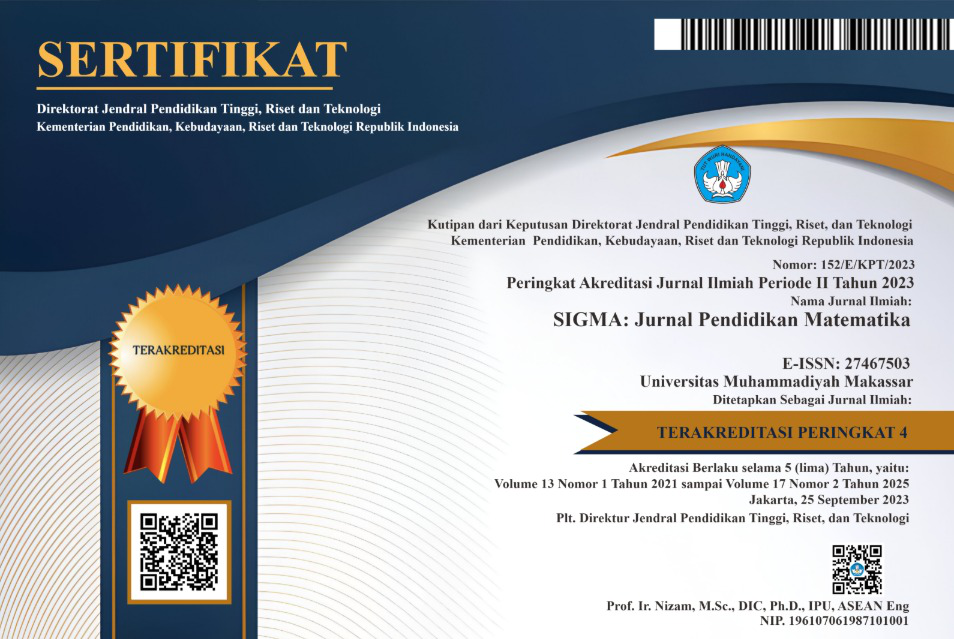PENGARUH POTENSI AKADEMIK, EFIKASI DIRI DAN KEMANDIRIAN BELAJAR TERHADAP HASIL BELAJAR MATEMATIKA
DOI:
https://doi.org/10.26618/sigma.v14i2.9328Keywords:
Academic Potential, Self-Efficacy, Learning Independence and Learning OutcomAbstract
This type of research was ex-post facto research. The population in this study were all students of class XI of SMK Negeri 2 Makassar while the sample in this study were XI TKJ 1 and XI TKJ 2, totaling 65 students. The sampling technique used cluster random sampling. Data analysis techniques using questionnaires and tests. Data analysis techniques used descriptive statiscal analysis and inferential statistic analysis techniques. The results of this study indicate that (1) Partially, the academic potential variable significantly influences the learning outcomes of students of class XI SMK Negeri 2 Makassar of 17.6%. (2) Partially self-efficacy variables significantly influence the mathematics learning outcomes of class XI students of SMK Negeri 2 Makassar by 43.4%. (3) Partially the learning independence variable has a significant effect on the learning outcomes of Grade XI students of SMK Negeri 2 Makassar by 78.8%. (4) Simultaneously the variables of academic potential, self-efficacy and learning independence significantly influence the learning outcomes of students of class XI in SMK Negeri 2 Makassar with a coefficient of determination R2 = 0.817 which means that the academic potential, self-efficacy and learning independence gave an effect of 81.7% on the mathematics learning outcomes of students of class XI of SMK Negeri 2 Makassar and the remaining 18.3% is influenced by other factors
References
Abdurrahman , M. (2003). Pendidikan Bagi Anak Berkesulitan Belajar . Jakarta : PT Rineka Cipta .
Abdurrahman , M. (2012 ). Anak Berkesulitan Belajar Teori Diagnosis Dan Remidiasinya. Jakarta : PT Rineka Cipta .
Aini, P. N. (2011). Pengaruh Kemandirian Belajar dan Lingkungan Belajar Siswa terhadap Prestasi Belajar Akuntansi Siswa Kelas XI IPS SMA Negeri 1 Sewon Bantul Tahun ajaran 2010/2011. Jurnal Pendidikan Akuntansi Indonesia. Vol. 10, No. 1, Hal 48.
Bungsu, T. K., Vilardi, M., Akbar, P., & Bernard, M. (2015). Pengaruh Kemandirian Belajar Terhadap Hasil Belajar Matematika di SMKN1 Cihampelas. Jurnal On Education. Vol. 1, No. 2, Hal 382. http://jonedu.org/index.php/joe/article/view/78/65. di akses tanggal 14 juni 2019
Ningsih, R., & Rahman, A. N. (2016). Pengaruh Kemandirian Belajar dan Perhatian Orang Tua Terhadap Prestasi Belajar Matematika. Universitas Sebelas Maret.
Nurhayati, E. (2011). Psikologi Pendidikan Inovatif . Yogyakarta: Pustaka Pelajar.
Nurul, A. B. (2016). Pengaruh Potensi Akademik, Kemampuan Berpikir Divergen, dan Kemandirian Belajar Terhadap Prestasi Belajar Matematika Siswa Kelas IX SMP Negeri 2 Sengkang. Makassar: Universitas Negeri Makassar
Desmita. (2017). Psikologi Perkembangan Peserta Didik . Bandung: PT Remaja Rosdakarya .
Siregar , N. R. (2017). Persepsi Siswa Pada Pelajaran Matematika . Unisula Semarang .
Sunardi. (2015). Pengaruh Potensi Akademik, Efikasi Diri dan Kemandirian Belajar Terhadap Prestasi Bealajar Matematika . Universitas Negeri Makassar.
Widganinggar, A. A. (2015). Pengaruh Efikasi Diri (lokus of control) Terhadap Prestasi Belajar Matematika. Jurnal Ilmiah Pendidikan MIPA. Vol. 4, No. 2. Hal 89. https://journal.lppmunindra.ac.id/index.php/Formatif/article/view/143. di akses tanggal 14 juni 2019
Downloads
Additional Files
Published
Issue
Section
License
With the receipt of the article by the SIGMA: Jurnal Pendidikan Matematika Editorial Board and the decision to be published, then the copyright regarding the article will be diverted to SIGMA: Jurnal Pendidikan Matematika.
Universitas Muhammadiyah Makassar as the publisher of SIGMA: Jurnal Pendidikan Matematika hold the copyright regarding all the published articles in this journal.Universitas Muhammadiyah Makassar has the right to multiply and distribute the article and every author is not allowed to publish the same article that was published in this journal.
The manuscript authentic and copyright statement submission can be downloaded ON THIS FORM.






